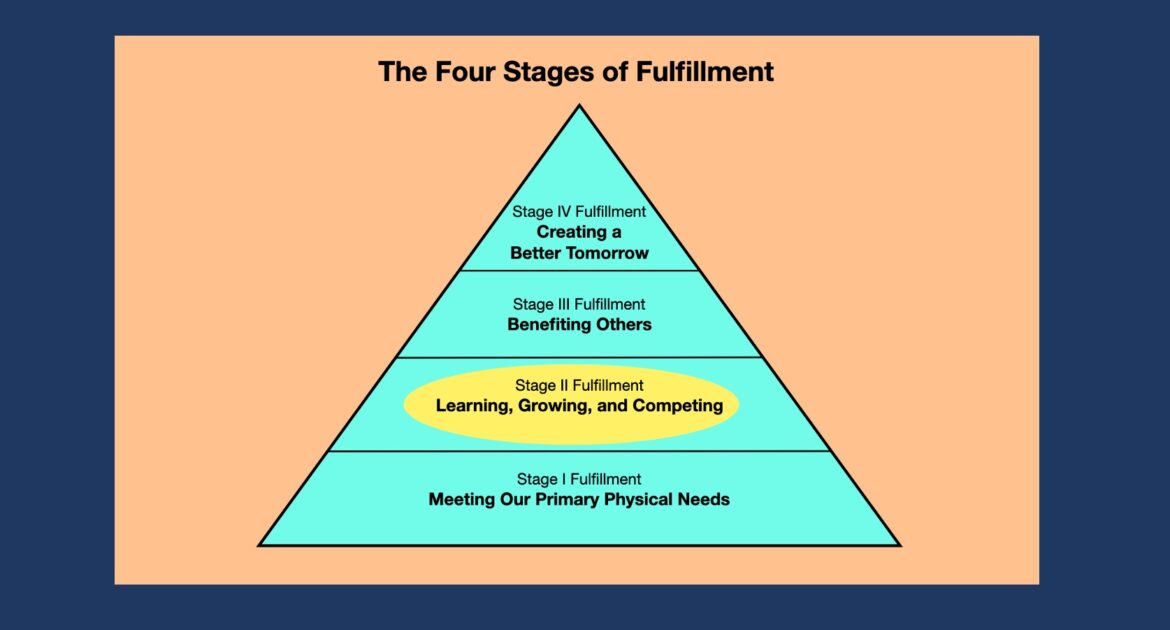Stage II Fulfillment: Learning, Growing, and Competing

We continue our series on the Four Stages of Fulfillment, a framework for understanding the motivation behind what you do daily. This week, we are exploring Stage II.
Stage II Fulfillment: Learning, Growing, and Competing
In the Four Stages of Fulfillment framework, each stage builds on the previous stage. When our Stage I primary needs have been met and we mature, we seek Stage II Fulfillment to compete with and compare ourselves to others. We begin to understand Stage II Fulfillment in early adolescence. We desire a foundation for independence, and we learn and grow to pave our path to survive and flourish. We begin to compare ourselves to others regarding knowledge, achievements, and possessions. We never lose our ego, so we are all competitors throughout our lifetime.
At Stage II, we pursue fulfillment by building our competencies to survive, achieve, and succeed. We may attain advanced degrees or pursue athletic or creative excellence. We compare our performance to that of others. We strive for more significant signs of accomplishment with compensation, titles, and recognition. While trying to become the best we can be, we build a strong base of competencies to serve us on our life’s journey.
With increased competency, we take on more significant challenges and can achieve more success. If we choose to direct our competency for the greater good, the process of seeking Stage II Fulfillment sets the foundation for making a positive impact on the world. But it can be hurtful too.
Some Become Stuck at Stage II Fulfillment
As accomplishments bring recognition, some are lured into the short-term satisfaction of seeking prestige, status, and money for themselves above all else. Their ego can blindly drive them to compare their success to others, and they see the accumulation of material goods as a sign that they are winning.
American entrepreneur Martin Shkreli had tremendous financial success and seemed to have a stellar career when he founded Turing Pharmaceuticals in early 2015. However, he earned widespread contempt in an arrogant pursuit of massive profits when, as demand surged, he increased the price of an anti-malarial drug by more than 5,000%. By the fall of 2015, he had been indicted for securities fraud.
There may be no greater disaster that exemplified the fixation on Stage II Fulfillment than the compensation systems in the American mortgage industry from 2004 to 2010. Mortgage loan officers and their superiors were rewarded handsomely when they sold harmful mortgage products to thousands of unsuspecting clients. The results hurt the clients, the stockholders, and, ultimately, the mortgage company and the entire nation. The shock of that recession, a result of their short-term reward systems, will take generations to move past.
The joy of Stage II Fulfillment and the energy it creates is fleeting, but it is vital to building a competent and robust foundation. While growing and becoming more competent is critical, living a life in service at this stage is a no-win proposition. Someone else will always know more, have more, or do more, which can lead to feeling behind in the game, and always defeated.
Stage II Fulfillment Attributes
- The primary impact is ego gratification.
- Understanding begins in early adolescence.
- Behaviors and experiences include learning, growing, getting better, and being more competent, with an emphasis on short-term accomplishment. It can be showy if one is ego-centric and seeking prestige.
- The fulfillment begins right away and lasts a short time, perhaps months.
- It is significant for building our competencies and confidence; it provides a strong base of skills and knowledge.
- The exemplars are gifted athletes, musicians, scientists, lottery winners, game show winners, and those with oversized houses, cars, and titles.
Those who stop maturing and seek to win at this stage show their success and want all to know how accomplished they are. Those who continue to mature use the competencies built at Stage II to benefit others in the Stage III level of fulfillment, which we will explore in next week’s post.
#ShiftFromMeToTeam #FourStagesOfFulfillment #Purpose






